Results
-
£84.99
Grace and Glory Wind Band Set (Score & Parts)
The chorale Glory to God on High is one of todays most often sung hymns. The words are an expression of praise to God and gratefulness for his mercy. The internationally familiar melody of this chorale forms the basis for Wim Stalman's Grace and Glory, in which the elements of praise and thanks are shown by means of both festive and more subdued melodies and harmonies. The choir parts allow the work to be performed by concert band with mixed choir. 0:04:53
Estimated dispatch 7-14 working days
-
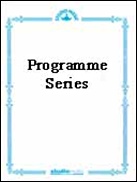 £87.95
£87.95SONGS OF THE BRITISH ISLES (Programme Concert Band) - Hingley, Barrie
A suite for band with optional choir (choir parts sold separately) which features well-known songs characterising England, Ireland, Scotland and Wales. There's even an optional bagpipes solo! Grade 4
Estimated dispatch 7-14 working days
-
 £64.95
£64.95WHEREVER YOU ARE (Concert Band) - Mealor, Paul - Stubbs, Duncan
Commissioned by Gareth Malone for Series Four of BBC TV's 'The Choir' and first performed by Malone and The Military Wives Choir as part of The Royal British Legion's Festival of Remembrance at the Royal Albert Hall on 12 November 2011, in the presence of Her Majesty The Queen. The text is taken from poems, letters and prayers written by the Military Wives, selected and adapted by Paul Mealor, and a passage from the Book of John. Selling a staggering 556,000 copies in the week leading up to Christmas, more than the rest of the Top 12 combined, Wherever You Are became the UK's Official Christmas No. 1 of 2011. A brass band version is also available. A contribution from the sales of the sheet music will be donated to the two nominated charities: The Royal British Legion and SSAFA Forces Help.
Estimated dispatch 7-14 working days
-
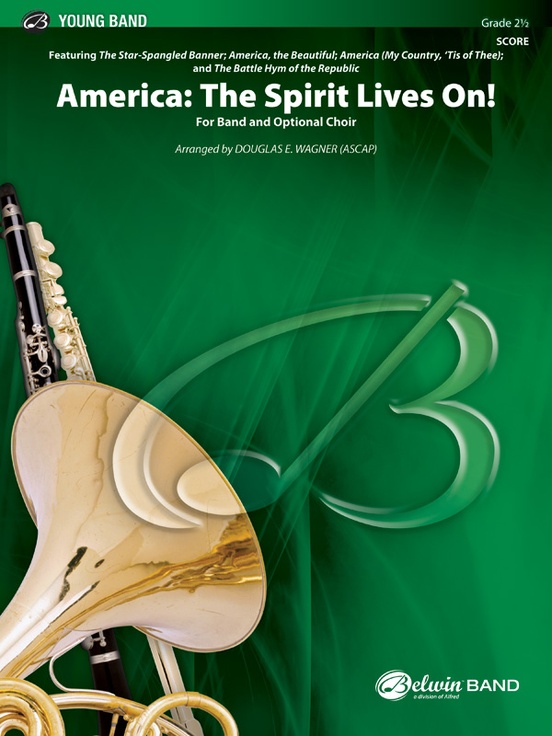 £58.50
£58.50America: The Spirit Lives On! (for Band and Optional Choir)
As a musical testament to the shared beliefs that we as Americans hold dear, this montage of four patriotic standards celebrates our democratic way of life, while also reflecting on the often-times high price that we as a nation must pay in order to maintain these treasured freedoms. Included in this arrangement (in the order that the titles appear) are ; ; ; and . This sparkling arrangement can be performed with your young band alone or with optional choir [SATB (33016), 3-part mixed (33017), or 2-part (33018)] as a rousing concert finale! (4:30) This title is available in MakeMusic Cloud.
Estimated dispatch 3-5 working days
-
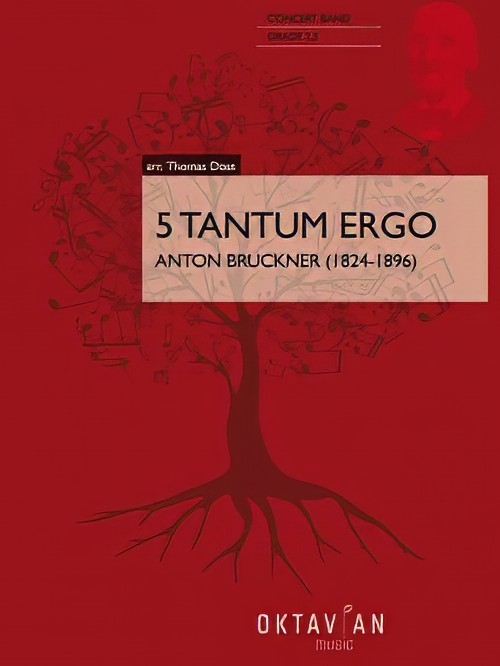 £95.99
£95.995 Tantum Ergo (Concert Band - Score and Parts) - Bruckner, Anton - Doss, Thomas
Anton Bruckner (b. 4.9.1824, Ansfelden, d. 11.10.1896, Vienna) didn't have it easy. Throughout his life, the Austrian composer was plagued by self-doubt. Anton Bruckner came from a simple, rural background. After the death of his father, he was accepted as a choirboy at the monastery of Sankt Florian in 1837. After several years as a school assistant and his own organ and piano studies, he first worked as organist in St. Florian, then from 1855 as cathedral organist in Linz. Introduced to music theory and instrumentation by Simon Sechter and Otto Kitzler, he discovered Richard Wagner as an artistic role model, whom he admired throughout his life and also visited several times in Bayreuth. In 1868 Anton Bruckner became professor of basso continuo, counterpoint and organ at the Vienna Conservatory; ten years later court organist; and in 1891 finally honorary doctor of the University of Vienna. He was considered an important organ virtuoso of his era, but had to wait a long time for recognition as a composer. It was not until Symphony No.7 in E major, composed between 1881 and 1883, with the famous Adagio written under the effects of Wagner's death, that he achieved the recognition he had hoped for, even if he was reluctant to accept it given his inclination towards scepticism and self-criticism. Anton Bruckner was a loner who did not want to follow a particular school or doctrine. He composed numerous sacred vocal works, such as his three masses, the Missa Solemnis in B flat minor (1854), the Te Deum (1881-84) and numerous motets. As a symphonic composer, he wrote a total of nine symphonies and many symphonic studies from 1863 onwards, tending to revise completed versions several times over. Bruckner's orchestral works were long considered unplayable, but in fact were merely exceptionally bold for the tonal language of their time, uniting traditions from Beethoven through Wagner to folk music, on the threshold between late Romanticism and Modernism. Hymns for four-part mixed choir a cappella (1846, St. Florian) No. 1 in E flat major (WAB 41/3): Quite Slow No. 2 in C major (WAB 41/4): Andante No. 3 in B flat major (WAB 41/1): Slow No. 4 in A flat major (WAB 41/2): Slow Hymn for five-part (SSATB) mixed choir and organ No. 5 in D major: Solemnly They are simple works, completely subordinate to their liturgical use, which nevertheless already show numerous characteristics of personal expression. These small pieces were able to stand up to the harsh scrutiny of the mature master: in 1888, Bruckner subjected them to a revision in which he made only minor corrections.Duration: 11.00
Estimated dispatch 7-14 working days
-
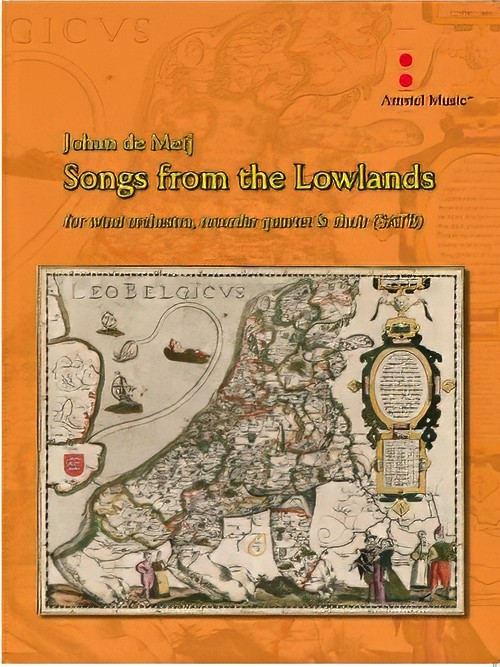 £156.00
£156.00Songs from the Lowlands (Recorder Quartet and Optional Choir with Concert Band - Score and Parts) - De Meij, Johan
Songs from the Lowlands is a collection of songs from the 16th and 17th centuries from my native country The Netherlands, formerly known as The Low Countries. They are, by turns, patriotic songs by Adriaen Valerius from the time when our country was occupied by Spain, naughty love songs and a drinking song, Peeckel-Haringh. Songs from the Lowlands was written for the farewell concert of my dear friend Jim Yarnell, who has been the director of bands at The American School of The Hague for four decades. Jim conducted the premire at his final concert, April 8, 2022, and now enjoys a well-deserved retirement.Duration: 12.00Songs from the Lowlands can be performed instrumental or with SATB choir (choral parts available separately).
Estimated dispatch 7-14 working days
-
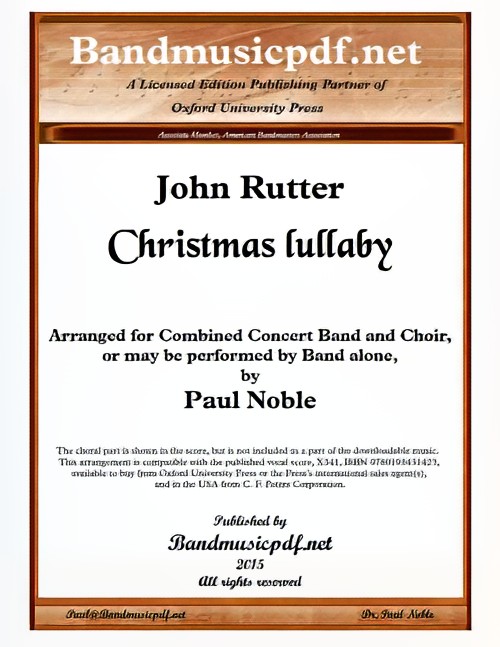 £75.00
£75.00Christmas Lullaby (Concert Band with Optional Choir - Score and Parts) - Rutter, John - Noble, Paul
Christmas Lullaby was commissioned by The Bach Choir in 1989 to celebrate the 70th birthday of their conductor, Sir David Willcocks. The choral parts are included in the score for reference, but are not included in the set. The arrangement is compatible with the published vocal score.
Estimated dispatch 7-14 working days
-
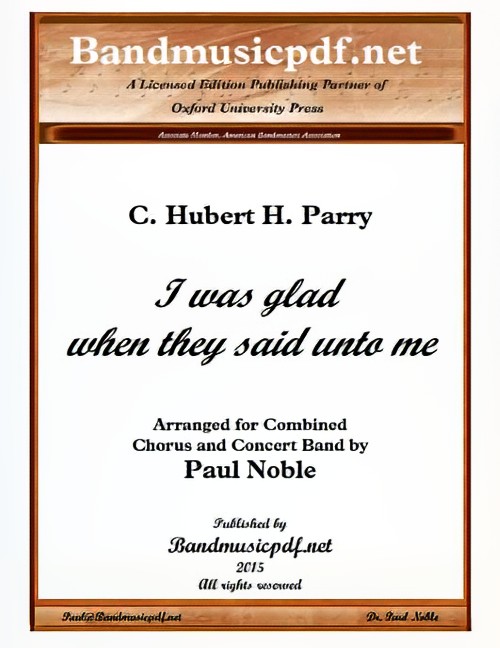 £110.00
£110.00I Was Glad When They Said Unto Me (Choir with Concert Band - Score and Parts) - Parry, Hubert C. - Noble, Paul
I Was Glad is an introit commonly used in the Anglican Church, and also used as an anthem traditionally sung at the coronation of the British monarch. Its most famous setting was written in 1902 by Sir Hubert Parry. Parry's version was composed for the coronation of King Edward VII in 1902, and revised in 1911 for that of King George V, when the familiar introduction was added. This setting employs antiphonal choir effects and brass fanfares. Apart from the imperial splendour of the music, the chief innovation is the incorporation in the central section of the acclamations Vivat Rex... or Vivat Regina... (Long live King/Queen...) with which the King's or Queen's Scholars of Westminster School have traditionally greeted the entrance of the monarch since the coronation of King James II in 1685. This section is generally omitted when the anthem is performed on other occasions. At the last coronation, that of Elizabeth II in 1953, the acclamation took the form of Vivat Regina Elizabetha. Parry's setting of I Was Glad was performed on 29 April 2011 at the Westminster Abbey wedding of Prince William, Duke of Cambridge and Catherine, Duchess of Cambridge (formerly Kate Middleton) as the processional music for the bride and her father and the bridal attendants. It had previously been performed at the wedding of the Duke's parents, Charles, Prince of Wales and Diana, Princess of Wales in 1981.
Estimated dispatch 7-14 working days
-
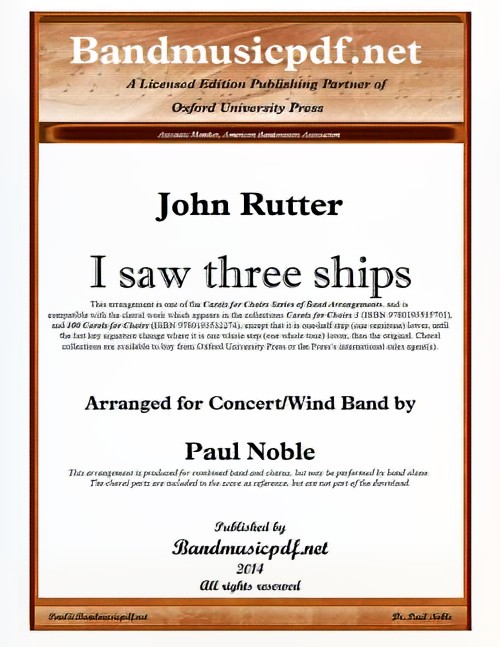 £75.00
£75.00I Saw Three Ships (Concert Band with Optional Choir - Score and Parts) - Rutter, John - Noble, Paul
John Rutter made this setting of an English folksong for The Bach Choir in 1977. The choral part is shown in the score, but is not included as a part of the set. This arrangement is compatible with the choral work which appears in the collections Carols for Choirs 3 and 100 Carols for Choirs, except that it is one-half step (one semitone) lower, until the last key signature change where it is one whole step (one whole tone) lower, than the original.
Estimated dispatch 7-14 working days
-
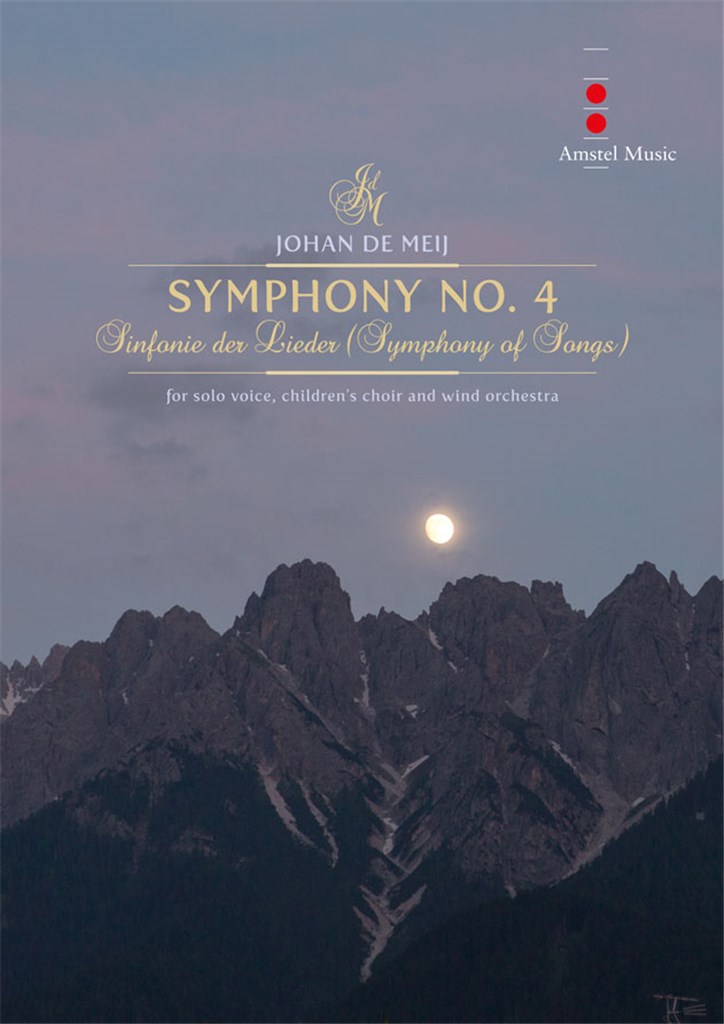 £340.00
£340.00Symphony No.4: Symphony of Songs (Solo Voice, Children's Choir and Concert Band - Score and Parts) - De Meij, Johan
Johan de Meij's 4th Symphony for solo voice, children's choir and wind orchestra is inspired by a variety of 19th century German poems.The first three movements use lyrics from the same source as Gustav Mahler did earlier: Kindertotenlieder by Friedrich Ruckert.:Ein Jahr ist nun geschwundenWenn zur Thur hereinWiedersehnThe second half of the symphony continues on the death theme, using a poem by Heinrich Heine (Two Brothers). The last two songs, Early Spring and Song of the Harlequin by Hugo von Hofmannsthal are a metaphor for rebirth, new life and hopeZwei Bruder (Heinrich Heine)Vorfruhling (Hugo von Hofmannsthal)Liedchen des Harlekin (Hugo von Hofmannsthal)Duration: 30:00
Estimated dispatch 7-14 working days
